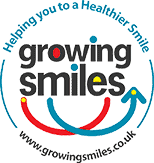Pre-birth & Pregnancy
You may not think that your mouth and oral health is important to consider if you are planning pregnancy. Oral health has a big impact on overall health and wellbeing and impacts our ability to eat, speak and smile. Parents oral health influences their own, and their baby’s smile for life. Hormones, cravings and vomiting all can affect your oral health during pregnancy and your health and wellbeing can impact on healthy tooth development.
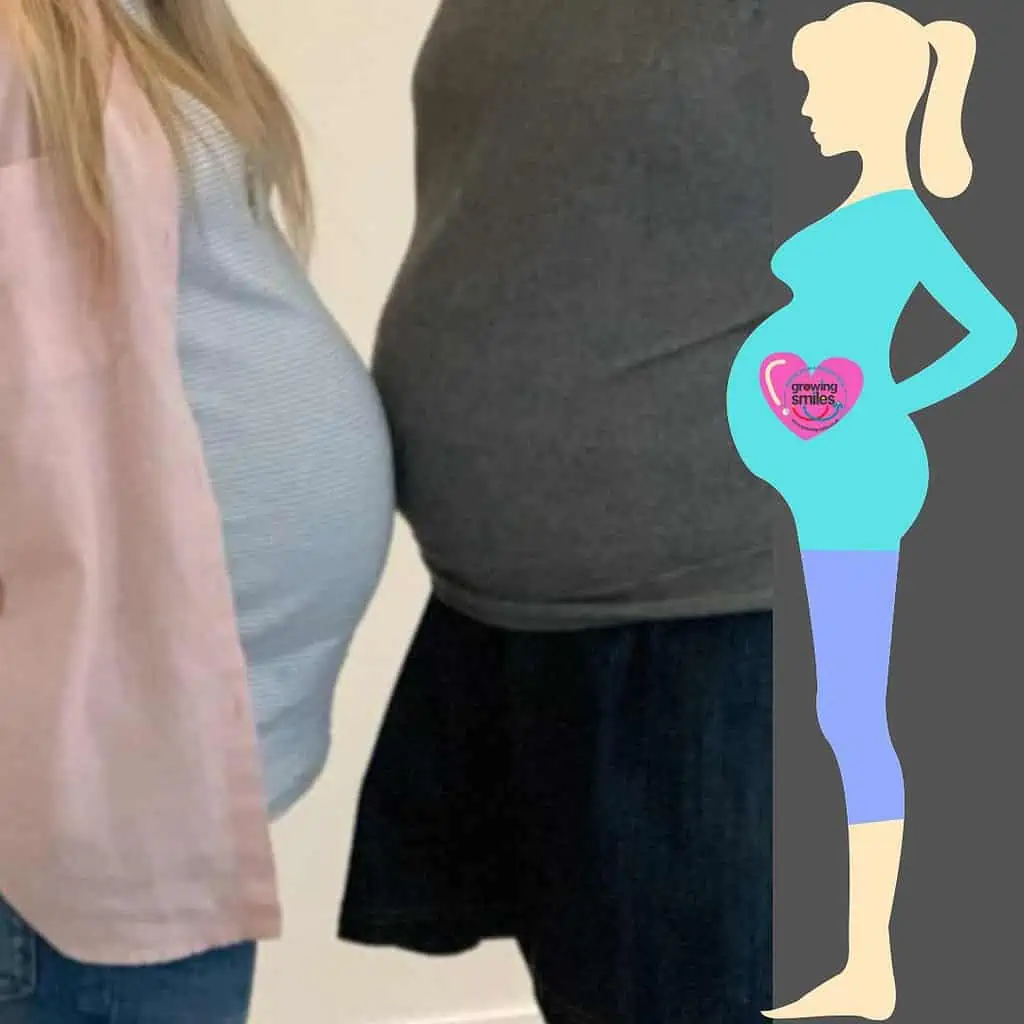
Growing Smiles Top Tips during pregnancy.
Keep well during pregnancy. Eat well – no need to eat for two! Drink plenty of water and eat a wide variety of foods for healthy nutrition throughout pregnancy. Avoid frequent snacking on sugary or acidic food and drinks and avoid these before bedtime. Don’t use alcohol, tobacco or drugs unless prescribed by your Dr. Take regular exercise. More about keeping well during pregnancy.
Clean well. Regular effective oral hygiene is key to a healthy smile during pregnancy. Clean between daily and brush last thing at night and one other time every day. Brush with a manual or power brush and fluoride toothpaste. Brush every surface of all teeth and along the gum line. NB healthy gums don’t bleed. Learn more here.
Nausea and vomiting. Don’t brush your teeth immediately after vomiting. Rinse with water instead or better still use something that will remineralise the tooth surface that has been attacked by stomach acid e.g. a smear of fluoride toothpaste, Alcohol free fluoride mouthwash or GC MI paste plus.
Summary
- Inside the Mouth – Parents’ oral health can impact baby’s oral health both short and long term. Mum’s oral health, in particular gum health in relation to healthy delivery and baby weight. Learn more below about how parents oral health influences baby’s healthy smile for life.
- Lifestyle, Health & Wellbeing – Nausea/vomiting, acid erosion and tooth wear. Planning for a healthy smile – Drugs (Smoking/Alcohol etc). General health. Medication. Exercise. Weight management.
- Oral Hygiene – Importance of effective cleaning for oral health. Cleaning teeth and gums, What to use. When to brush, clean between and how pregnancy may affect usual oral hygiene routines. How to control plaque biofilm effectively for your oral health. Other oral hygiene aids to benefit oral health at this time.
- Diet & Nutrition – Eating well for a healthy pregnancy and healthy baby. Cravings and control of any potential negative impact. Snacks and Drinks – what you choose and when.
- Professional Dental Care – Access to dental treatment during pregnancy. Dental priorities for parents. When to visit. Treatment options. Cost of treatment during pregnancy. Dental anxiety.
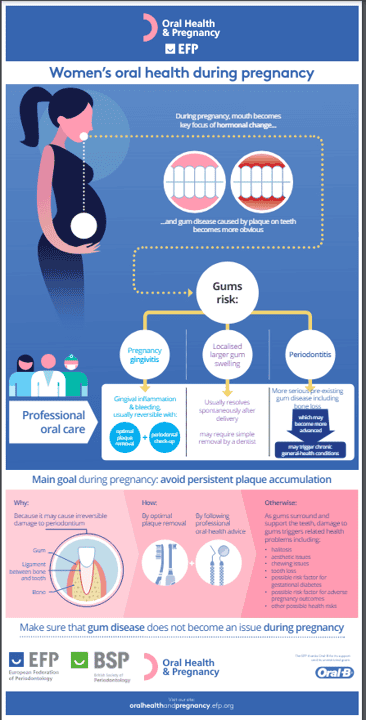
During pregnancy, increased hormonal levels can affect the way that the body reacts to dental plaque
and this can lead to swollen and bleeding gums (gingivitis) and to the more serious form of gum disease
known as periodontitis.
Associations between periodontal diseases and adverse pregnancy outcomes have been demonstrated
– a pregnant woman with poor gum health may have a greater risk of suffering from pre-eclampsia, of
giving birth prematurely, and of giving birth to an underweight child.
Specific plaque removal regimens and professional periodontal treatment have been shown to be safe
when carried out on pregnant women, and efficient in reducing gingival inflammation and in enabling
periodontal health to be maintained during pregnancy. (BSP/EFP)
Learn more here.
Inside the Mouth
Parents Oral Health
Maintaining a healthy mouth during pregnancy is important for parents and especially Mum to be. Expectant parents should aim to get their own mouths in tip top condition. This establishes good oral care routines in your home and also reduces the risk of problems developing during pregnancy and those early months with a new baby, when mouth care may well not be top of the priority list!
Hormonal changes that occur during pregnancy puts women at increased risk of developing oral problems. These include tooth decay, sensitivity, gum inflammation (gingivitis) and the more serious gum disease, periodontitis. Reports suggest that up to 75% of pregnant women suffer from bleeding gums (gingivitis), one in three are affected by serious gum disease (periodontitis) and one in four have tooth decay during pregnancy. Untreated tooth decay in parents nearly doubles the chance of your child having early childhood tooth decay through the transfer of decay causing bacteria from parents to child e.g by sharing the same spoon while feeding baby. Getting your own mouth healthy will benefit you and your baby.
Increased hormone levels during pregnancy can affect how your body reacts to dental plaque (plaque biofilm/bacterial plaque). This can lead to swollen and bleeding gums (gingivitis) and to the more serious form of gum disease, periodontitis. Research shows a strong link between pregnancy and adverse pregnancy outcomes including preterm birth, fetal growth restriction, low birthweight, pre-eclampsia and gestational diabetes. Effective daily oral hygiene (toothbrushing and interdental cleaning /cleaning between teeth) should be part of your personal hygiene routine for your own and your baby’s oral health.
You will find the answers to some FAQ’s about pregnancy and oral health here.
Start4Life is the trusted NHS source for help and advice during pregnancy, birth and parenthood. It includes content on breastfeeding and weaning.
Baby Teeth & Jaw Development
Baby (milk/primary) teeth and jaws start to develop during pregnancy.
Teeth start to develop in the baby’s jaw around 6 -8 weeks of pregnancy (gestation).
All baby teeth will be calcified by birth even though the first tooth doesn’t usually make an appearance until around 6 months.
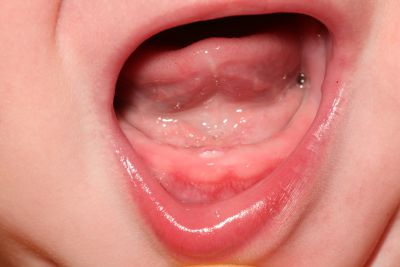
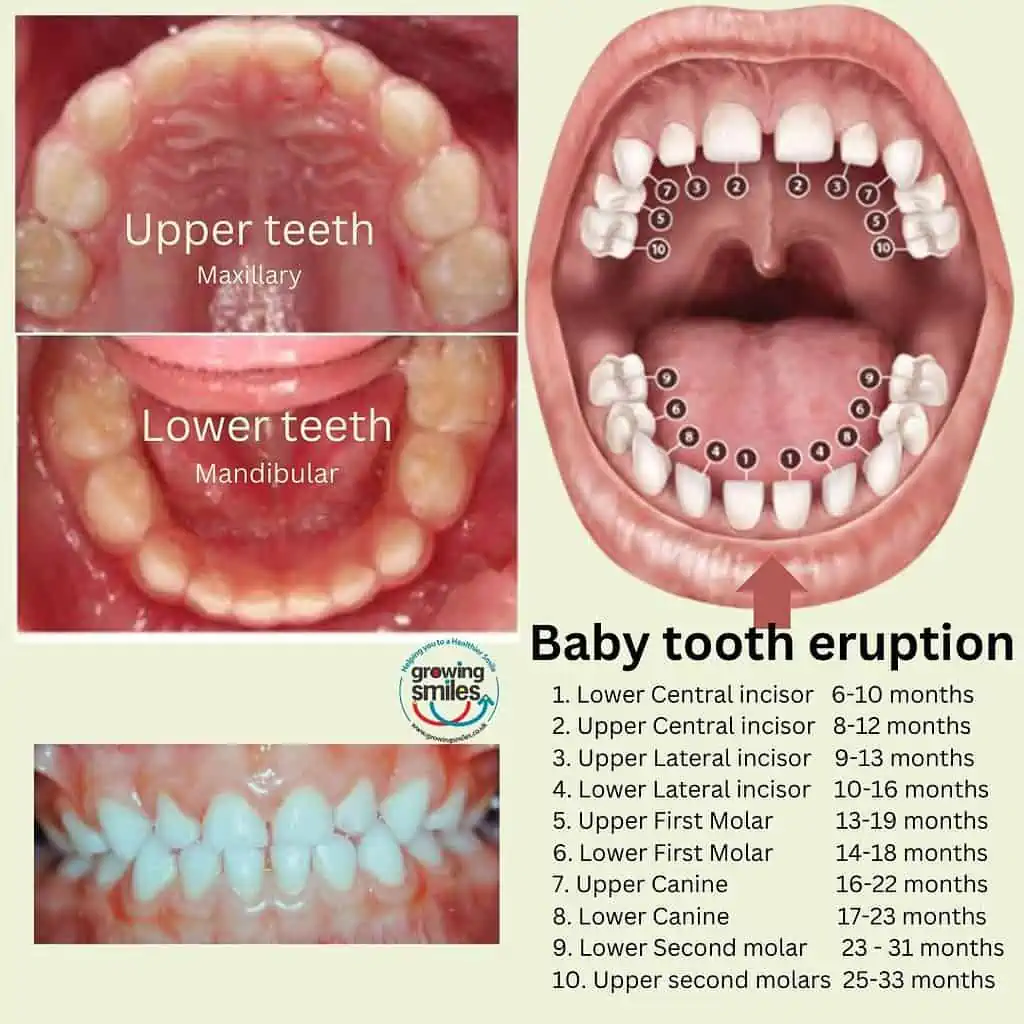
By the age of around 2 1/2 all 20 baby teeth will have erupted into the mouth. 4 incisors, 2 canines, 4 molars top and bottom.
All the baby teeth aren’t replaced by adult (permanent) teeth until 12 or 13 years of age.
Different parts of a baby’s face develop early in pregnancy and develop separately then join together. If some parts do not join properly, the baby is born with a cleft. A cleft lip and/or palate is the most common craniofacial abnormality (a problem to do with the skull and face) which babies can be born with. A cleft is a gap or split in the upper lip and/or roof of the mouth (palate). It is present from birth. A cleft lip and palate is the most common facial birth defect in the UK, affecting around 1 in every 700 babies.
A cleft lip is usually picked up during the 18 – 21 weeks scan in pregnancy. Not all cleft lips will be obvious on this scan and it’s very difficult to detect a cleft palate on an ultrasound scan. If a cleft lip or palate does not show up on the scan, it’s usually diagnosed immediately after birth or during the newborn examination done within 72 hours of birth. When a cleft lip or palate is diagnosed, in the UK you will be referred to a specialist team who will explain your child’s condition, discuss the treatments and answer questions. Learn more about cleft lip/palate. CLAPA is a UK charity that supports children and their families born with cleft lip/palate.
Lifestyle, Health & Wellbeing
Parents oral health and their oral care habits will set the scene for your little bundle of joy’s healthy smile for life. Looking after yourself and keeping well during pregnancy will benefit you and baby. A common belief is that women lose a tooth with each pregnancy. But with good oral hygiene and professional oral health care, pregnant women’s teeth can stay healthy.
Tooth enamel in underweight babies may be weaker and they are at increased risk of developing dental problems.
Nausea and Vomiting (Morning Sickness)
Cravings for certain foods when pregnant is not unusual but depending on what and how often certain foods are consumed there may be a cost to your oral health.
NB. Do NOT brush your teeth immediately after vomiting. The acid from your stomach will have softened the tooth surfaces and if you brush you can cause wear of the tooth surfaces. Instead rinse with water or fluoride mouth rinse, or smear a little fluoride toothpaste around the teeth. Wait for at least 30 minutes before brushing.
Oral Hygiene
Early childhood tooth decay is related to the oral microbiome in the mouth. A microbiome is the community of microorganisms( including bacteria and fungi) that can usually be found living together in any habitat. In the mouth that habitat is the plaque biofilm that develops on all surfaces in the mouth.The oral microbiome is a community of microorganisms, mainly bacteria, found within the mouth. The mouth is ideal for growth of certain microorganisms and this oral microbiome may be influenced by diet, oral health care, fluoride use, and dental care. Good oral hygiene during pregnancy can improve Mum’s oral microbiome and reduce the transfer of ‘bad’ bacteria from Mother to baby.
Gum Health During Pregnancy
Healthy gums don’t bleed when you brush or clean between teeth/floss. Be aware of the most common signs of gum disease and check your mouth to look for swollen and/or bleeding gums. Pain during chewing, bad breath, receding gums or loose teeth are warning signs that women should attend a dentist, dental therapist or dental hygienist for treatment as soon as possible. Swollen, bleeding gums are not normal or healthy – contact your dental team for advice and treatment.
Increased hormonal levels can affect the way your body reacts to dental plaque. This can lead to swollen and bleeding gums (gingivitis) and to the more serious form of gum disease, periodontitis.
Daily, effective oral hygiene is important during pregnancy, It ensures your mouth is in good condition as well as setting the scene for good family oral care routines.
Clean between teeth daily to reach surfaces your toothbrush can’t reach.
Brush all surfaces of every tooth especially around the gum line using a manual or rechargeable toothbrush and fluoride toothpaste. Brush before bedtime and one other time every day.
Avoid brushing after vomiting and rinse mouth with water. Apply fluoride toothpaste with finger to improve taste in mouth or use fluoride mouthwash.
The British Society of Periodontology has a number of resources to help learn more about gum health and pregnancy –
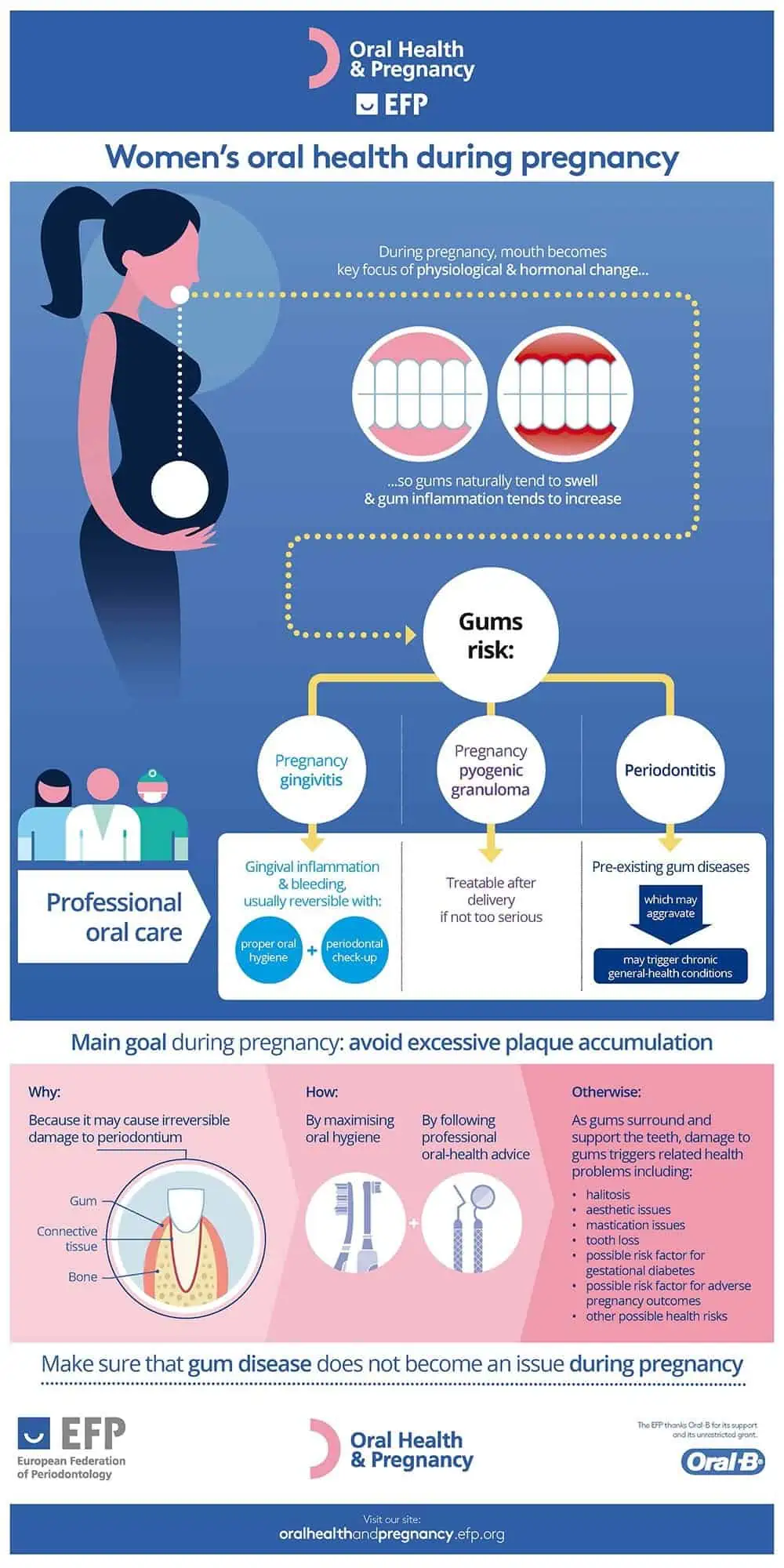
Diet & Nutrition
Mothers nutrition during pregnancy is important her and baby’s overall health and is also for healthy tooth and jaw development. Your baby’s teeth do not take calcium from Mum’s teeth but rely on the nutrients in the mothers diet – a good reason to eat a healthy diet during pregnancy. Certain medicines (e.g. tetracycline) should not be taken during pregnancy as these can cause the unborn baby’s developing teeth to be discoloured. Speak to you health care team.
It’s recommended that if you’re pregnant or planning to become pregnant you should not drink alcohol. This will keep any risk to your baby to a minimum. Drinking in pregnancy can lead to long-term harm to the baby, with the more you drink, the greater the risk. Learn more about drinking alcohol during pregnancy.
Xylitol during pregnancy can reduce the number of decay causing bacteria (Streptococcus mutans) in the mum’s mouth. This can be beneficial for her dental health. A number of mother-child studies have shown that xylitol can help transferring harmful bacteria to baby. This has been shown to have long-term benefits on the child’s future experience of tooth decay.
Thinking ahead. Breastfeeding offers a great start to baby and benefits lifelong health. Breastfeeding up to 12 months of age is associated with decreased risk of tooth decay and being less likely to develop malocclusions compared with ‘never breastfed’ children.
Professional Dental Care
Dental Treatment for Mum to Be
Repeated vomiting can cause serious damage to your teeth. Stomach acid dissolves tooth enamel (acid erosion), leaving the tooth weakened which may lead to sensitivity and thin enamel. DON’T brush your teeth immediately after vomiting as this can increase wearing away of the tooth surfaces. After vomiting don’t brush for at least 45 minutes. To remineralise (reharden) the tooth surface immediately after vomiting or reflux, rinse with an alcohol free fluoride mouth wash, water, or spread a little fluoride tooth paste or another remineralising product e.g. GC MIPaste plus around the teeth to counteract the the potential damage after acid attack.
Often visiting your dental team when planning and during pregnancy is overlooked. This may be due to concerns about cost, being able to access suitable dental care or possibly not realising how important oral health is at this time both for you and your baby’s future oral health. In the UK pregnant women and women who have had a baby in the last 12 months get free NHS dental treatment. You may have to show proof, such as a maternity exemption certificate (MAtEx) or maternity certificate (MATB1), or your baby’s birth certificate.
Even if you don’t have any problems its is important to visit your dental team regularly for advice and suitable preventive measures. It’s important to tell your dental team that you are pregnant or trying to become pregnant. Always let your dental team know if you are or may be pregnant, how far along you are, and if your pregnancy is high-risk.
Dental care may include professional cleaning and advise on how to look after your teeth and gums at home. Gum treatment can be provided safely during pregnancy and has been shown to improve gum health of pregnant women. You can learn more about gum health during pregnancy at British Society of Periodontology. Tell your dental team if you planning pregnancy and if you are pregnant.
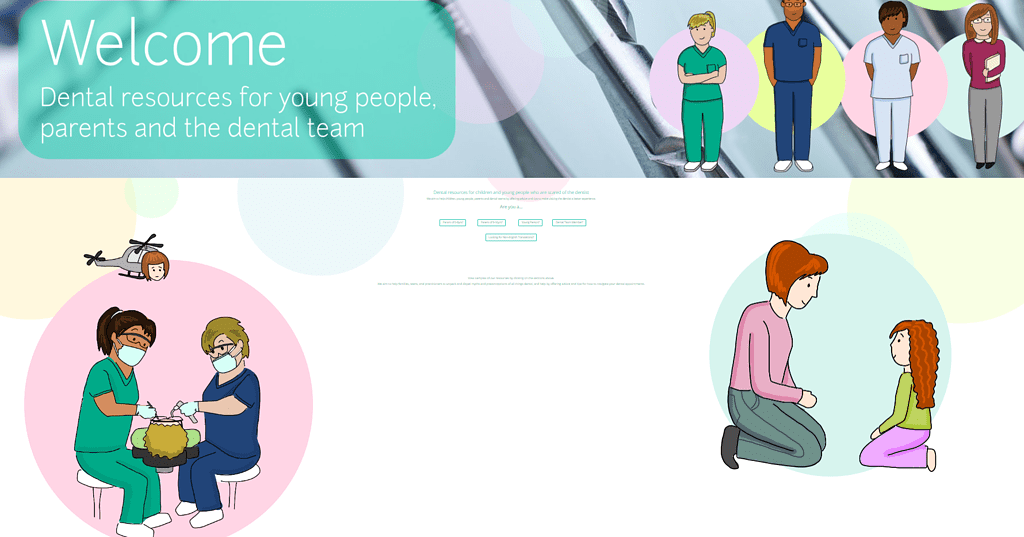
Worried about going to the dentist? We recommend visiting LLTTF which has advise and tips to make visiting the dentist a better experience.
